英语听力
英语听力内容题材
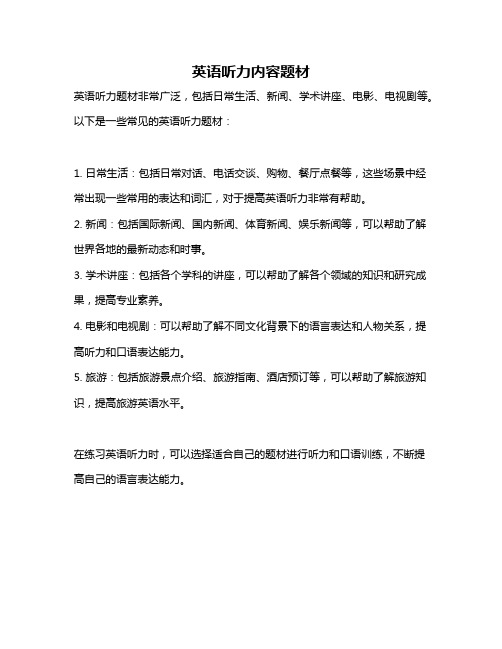
英语听力内容题材
英语听力题材非常广泛,包括日常生活、新闻、学术讲座、电影、电视剧等。
以下是一些常见的英语听力题材:
1. 日常生活:包括日常对话、电话交谈、购物、餐厅点餐等,这些场景中经常出现一些常用的表达和词汇,对于提高英语听力非常有帮助。
2. 新闻:包括国际新闻、国内新闻、体育新闻、娱乐新闻等,可以帮助了解世界各地的最新动态和时事。
3. 学术讲座:包括各个学科的讲座,可以帮助了解各个领域的知识和研究成果,提高专业素养。
4. 电影和电视剧:可以帮助了解不同文化背景下的语言表达和人物关系,提高听力和口语表达能力。
5. 旅游:包括旅游景点介绍、旅游指南、酒店预订等,可以帮助了解旅游知识,提高旅游英语水平。
在练习英语听力时,可以选择适合自己的题材进行听力和口语训练,不断提高自己的语言表达能力。
英语听力注意事项及技巧
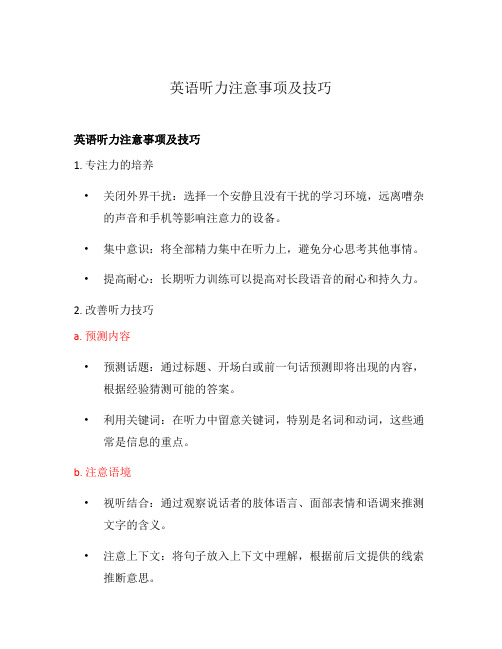
英语听力注意事项及技巧英语听力注意事项及技巧1. 专注力的培养•关闭外界干扰:选择一个安静且没有干扰的学习环境,远离嘈杂的声音和手机等影响注意力的设备。
•集中意识:将全部精力集中在听力上,避免分心思考其他事情。
•提高耐心:长期听力训练可以提高对长段语音的耐心和持久力。
2. 改善听力技巧a. 预测内容•预测话题:通过标题、开场白或前一句话预测即将出现的内容,根据经验猜测可能的答案。
•利用关键词:在听力中留意关键词,特别是名词和动词,这些通常是信息的重点。
b. 注意语境•视听结合:通过观察说话者的肢体语言、面部表情和语调来推测文字的含义。
•注意上下文:将句子放入上下文中理解,根据前后文提供的线索推断意思。
c. 针对细节•注意特殊词汇:关注特殊词汇的发音、拼写和意义,可以加强对话题的理解。
•区分近义词:细心辨别近义词的差异,了解不同词语在不同语境中的用法。
d. 收听不同口音•增加听力素材:尝试听取不同地区的英语口音,扩大对不同发音和语速的适应能力。
3. 提高听力技能的方法a. 多听多练•听力材料选择:选择适合自己英语水平和兴趣的听力材料,如TED Talks、BBC节目等。
•多样化题材:涉及不同领域和话题的听力练习,有助于熟悉各种词汇和表达方式。
b. 听力笔记的技巧•笔记要点:将重要内容或关键词写在笔记中,以便后续复习和巩固记忆。
•笔记简洁明了:用简洁的短语或关键词进行记录,避免过于冗长而导致错过内容。
c. 利用辅助工具•听力软件:使用配有字幕功能的软件进行听力练习,同时借助字幕辅助理解。
•慢速播放:将听力材料在较慢的速度下播放,逐渐增加速度以提高听力反应能力。
通过以上注意事项和技巧,你可以有效地提高英语听力水平,并更好地理解和运用所听取的内容。
不断的练习和积累经验,你将逐渐成为一个优秀的英语听力者。
英语听力试题及答案

英语听力试题及答案一、听句子,选择正确答案(共5题,每题2分,满分10分)1. What does the woman want to do?A. Buy a new dress.B. Go to the library.C. Visit her grandmother.2. How much will the man pay for the tickets?A. $20.B. $40.C. $60.3. What is the weather like today?A. Sunny.B. Rainy.C. Cloudy.4. Where is the meeting held?A. In the conference room.B. In the office.C. In the cafeteria.5. What time does the train leave?A. At 9:00 a.m.B. At 10:00 a.m.C. At 11:00 a.m.二、听对话,选择正确答案(共5题,每题2分,满分10分)6. What are the speakers mainly talking about?A. A new movie.B. A travel plan.C. A restaurant.7. Why does the man refuse the woman's invitation?A. He is too busy.B. He has to work.C. He doesn't like her.8. What is the woman's opinion about the book?A. It's boring.B. It's interesting.C. It's too long.9. What does the man suggest doing?A. Going to the gym.B. Watching a movie.C. Cooking dinner.10. What is the relationship between the speakers?A. Teacher and student.B. Boss and employee.C. Friends.三、听短文,选择正确答案(共5题,每题2分,满分10分)11. What is the main topic of the passage?A. Environmental protection.B. Technological advancement.C. Cultural exchange.12. How many countries are mentioned in the passage?A. Two.B. Three.C. Four.13. What is the speaker's purpose in the passage?A. To inform.B. To persuade.C. To entertain.14. What does the speaker think about the future?A. It's promising.B. It's uncertain.C. It's challenging.15. What is the speaker's recommendation?A. To take action immediately.B. To wait and see.C. To do more research.四、听填空,根据所听内容填写信息(共5题,每题2分,满分10分)16. The museum is open from _______ to _______ on weekdays.17. The _______ is the most popular exhibit in the museum.18. The _______ is the best time to visit the museum.19. The museum offers free admission on _______.20. The museum is located at _______ Street.五、听写句子,根据所听内容写出完整的句子(共5题,每题2分,满分10分)21. The _______ is the most important event of the year.22. _______ is the best way to learn a new language.23. The _______ has been closed due to the storm.24. _______ is the capital of _______.25. _______ is the most famous landmark in the city.答案:一、1-5 C B A B A二、6-10 B A B A C三、11-15 A B A A A四、16. 9:00 a.m.; 5:00 p.m. 17. The dinosaur exhibit 18. During the weekdays 19. Tuesday 20. Main五、21. Annual conference 22. Immersion 23. The airport 24. Washington D.C.; United States 25. The Eiffel Tower。
九年级(中考)英语听力训练100篇
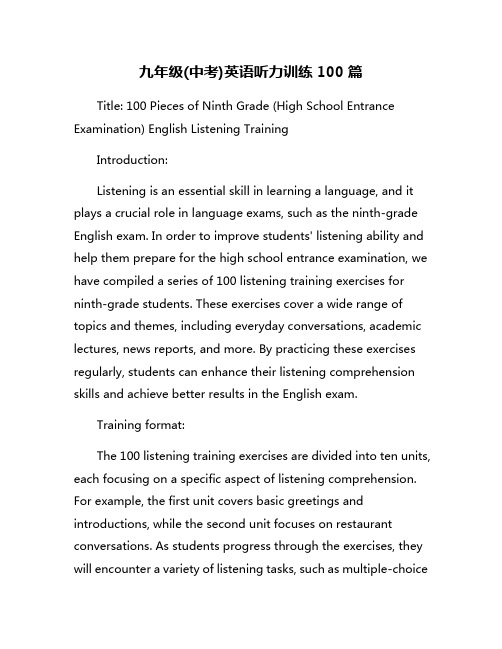
九年级(中考)英语听力训练100篇Title: 100 Pieces of Ninth Grade (High School Entrance Examination) English Listening TrainingIntroduction:Listening is an essential skill in learning a language, and it plays a crucial role in language exams, such as the ninth-grade English exam. In order to improve students' listening ability and help them prepare for the high school entrance examination, we have compiled a series of 100 listening training exercises for ninth-grade students. These exercises cover a wide range of topics and themes, including everyday conversations, academic lectures, news reports, and more. By practicing these exercises regularly, students can enhance their listening comprehension skills and achieve better results in the English exam.Training format:The 100 listening training exercises are divided into ten units, each focusing on a specific aspect of listening comprehension. For example, the first unit covers basic greetings and introductions, while the second unit focuses on restaurant conversations. As students progress through the exercises, they will encounter a variety of listening tasks, such as multiple-choicequestions, gap-fill exercises, and dictation tasks. This variety helps students develop different listening strategies and become more confident in their listening skills.Tips for effective listening practice:- Listen actively: Pay attention to the speaker's tone, speed, and intonation to better understand the message.- Take notes: Write down key points or keywords to help you remember important information.- Practice regularly: Set aside time each day to practice listening exercises, and try to challenge yourself with more difficult tasks as you improve.- Use resources: Utilize online resources, such as language learning websites and apps, to supplement your listening practice and expose yourself to different accents and speech patterns.Conclusion:Improving listening skills is a gradual process that requires time, effort, and practice. By using the 100 listening training exercises provided, ninth-grade students can enhance their listening comprehension abilities and perform better in the highschool entrance examination. With dedication and perseverance, students can achieve success in their English studies and beyond.。
英语高考听力考试技巧(精选5篇)
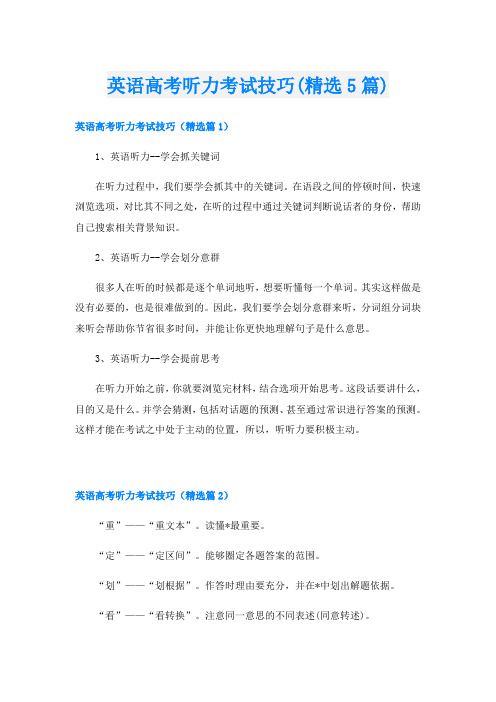
英语高考听力考试技巧(精选5篇)英语高考听力考试技巧(精选篇1)1、英语听力--学会抓关键词在听力过程中,我们要学会抓其中的关键词。
在语段之间的停顿时间,快速浏览选项,对比其不同之处,在听的过程中通过关键词判断说话者的身份,帮助自己搜索相关背景知识。
2、英语听力--学会划分意群很多人在听的时候都是逐个单词地听,想要听懂每一个单词。
其实这样做是没有必要的,也是很难做到的。
因此,我们要学会划分意群来听,分词组分词块来听会帮助你节省很多时间,并能让你更快地理解句子是什么意思。
3、英语听力--学会提前思考在听力开始之前,你就要浏览完材料,结合选项开始思考。
这段话要讲什么,目的又是什么。
并学会猜测,包括对话题的预测、甚至通过常识进行答案的预测。
这样才能在考试之中处于主动的位置,所以,听听力要积极主动。
英语高考听力考试技巧(精选篇2)“重”——“重文本”。
读懂*最重要。
“定”——“定区间”。
能够圈定各题答案的范围。
“划”——“划根据”。
作答时理由要充分,并在*中划出解题依据。
“看”——“看转换”。
注意同一意思的不同表述(同意转述)。
“防”——“防陷井”。
锁定是“true”还是“not true”,辨明形近词。
“读”——“读全项”。
做判断时要通读每一题的所有选项,区分鉴别,选择最佳。
很多同学在英语阅读理解中,都错在了关键的第一步——审题上。
那么到底如何看题干,我们应该看哪里?大部分同学知道,用时间、大写词去定位,但其实这只是最基本的定位信息。
A. 看似松散,一般每篇只有四个问题,实则考查对*中心思想的把握能力。
B. 看似粗线条,根据文中具体信息便可判断正确答案,实则考查句意理解的精确度。
C. 抓住关键句,每段的首句大抵是本段的关键句。
英语高考听力考试技巧(精选篇3)1、集中注意力考生在听英语听力的时候,要稳定自己的心理,这样才能发挥出自己的正常的水平。
而过于紧张焦急的情绪则会容易产生恐惧心理,使听力的反应速度变慢,对把握信息的准确度大打折扣。
英语听力试题及答案
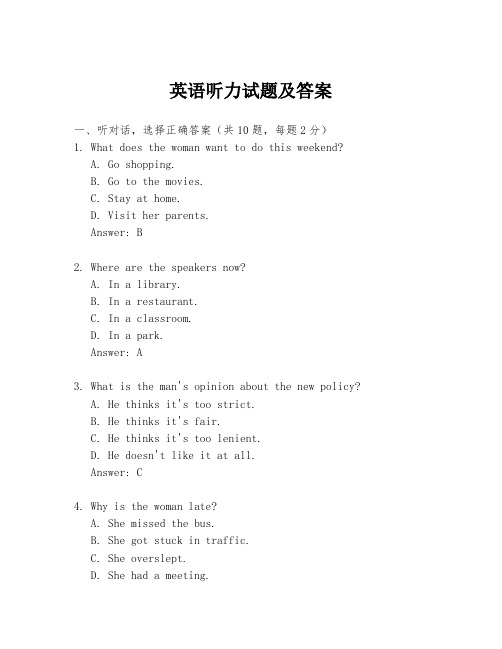
英语听力试题及答案一、听对话,选择正确答案(共10题,每题2分)1. What does the woman want to do this weekend?A. Go shopping.B. Go to the movies.C. Stay at home.D. Visit her parents.Answer: B2. Where are the speakers now?A. In a library.B. In a restaurant.C. In a classroom.D. In a park.Answer: A3. What is the man's opinion about the new policy?A. He thinks it's too strict.B. He thinks it's fair.C. He thinks it's too lenient.D. He doesn't like it at all.Answer: C4. Why is the woman late?A. She missed the bus.B. She got stuck in traffic.C. She overslept.D. She had a meeting.Answer: B5. What are the speakers talking about?A. A new book.B. A new movie.C. A new restaurant.D. A new job.Answer: A6. What time does the train leave?A. At 6:30.B. At 7:00.C. At 7:30.D. At 8:00.Answer: C7. How much does the woman need to pay for the dress?A. $50.B. $75.C. $100.D. $125.Answer: B8. What is the weather like today?A. Sunny.B. Rainy.C. Cloudy.D. Snowy.Answer: A9. Who will be in charge of the project?A. The man.B. The woman.C. The boss.D. The assistant.Answer: A10. What is the woman's major?A. Biology.B. Chemistry.C. Physics.D. Mathematics.Answer: D二、听短文,完成信息填空(共5题,每题2分)11. The lecture is about ________.Answer: environmental protection12. The speaker suggests that people should ________.Answer: reduce their carbon footprint13. One of the ways to protect the environment is by ________. Answer: recycling14. The speaker mentions that deforestation leads to ________. Answer: loss of biodiversity15. The lecture will be held at ________.Answer: the university auditorium三、听长对话,回答问题(共5题,每题2分)16. What is the main topic of the conversation?Answer: Travel plans for the upcoming vacation17. Where does the man want to go?Answer: The man wants to go to the beach.18. What is the woman's concern about traveling during the peak season?Answer: The woman is concerned about the high cost and crowded places.19. What does the man suggest as an alternative?Answer: The man suggests traveling during the off-peak season.20. What is the woman's final decision?Answer: The woman decides to consider the man's suggestion.。
英语听力技巧(优秀10篇)
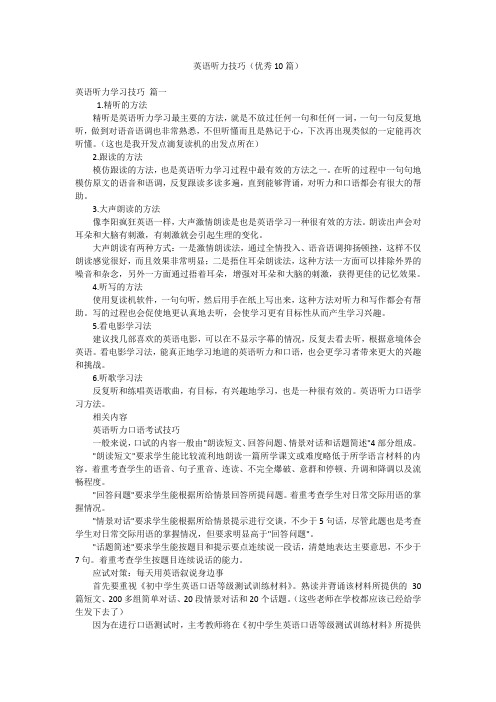
英语听力技巧(优秀10篇)英语听力学习技巧篇一1.精听的方法精听是英语听力学习最主要的方法,就是不放过任何一句和任何一词,一句一句反复地听,做到对语音语调也非常熟悉,不但听懂而且是熟记于心,下次再出现类似的一定能再次听懂。
(这也是我开发点滴复读机的出发点所在)2.跟读的方法模仿跟读的方法,也是英语听力学习过程中最有效的方法之一。
在听的过程中一句句地模仿原文的语音和语调,反复跟读多读多遍,直到能够背诵,对听力和口语都会有很大的帮助。
3.大声朗读的方法像李阳疯狂英语一样,大声激情朗读是也是英语学习一种很有效的方法。
朗读出声会对耳朵和大脑有刺激,有刺激就会引起生理的变化。
大声朗读有两种方式:一是激情朗读法,通过全情投入、语音语调抑扬顿挫,这样不仅朗读感觉很好,而且效果非常明显;二是捂住耳朵朗读法,这种方法一方面可以排除外界的噪音和杂念,另外一方面通过捂着耳朵,增强对耳朵和大脑的刺激,获得更佳的记忆效果。
4.听写的方法使用复读机软件,一句句听,然后用手在纸上写出来,这种方法对听力和写作都会有帮助。
写的过程也会促使地更认真地去听,会使学习更有目标性从而产生学习兴趣。
5.看电影学习法建议找几部喜欢的英语电影,可以在不显示字幕的情况,反复去看去听,根据意境体会英语。
看电影学习法,能真正地学习地道的英语听力和口语,也会更学习者带来更大的兴趣和挑战。
6.听歌学习法反复听和练唱英语歌曲,有目标,有兴趣地学习,也是一种很有效的。
英语听力口语学习方法。
相关内容英语听力口语考试技巧一般来说,口试的内容一般由"朗读短文、回答问题、情景对话和话题简述"4部分组成。
"朗读短文"要求学生能比较流利地朗读一篇所学课文或难度略低于所学语言材料的内容。
着重考查学生的语音、句子重音、连读、不完全爆破、意群和停顿、升调和降调以及流畅程度。
"回答问题"要求学生能根据所给情景回答所提问题。
英语听力中英对照

英语听力中英对照英语听力是提高英语听力能力的重要方法之一。
通过听力训练,可以提高对英语语音、语调、语速等方面的理解能力,从而更好地理解和运用英语。
在英语听力中,对照式听力是一种常见的训练方法,即同时提供英语原文和中文翻译,让学习者在听力过程中能够对照着理解。
对照式听力的好处在于,学习者可以通过对照英文原文和中文翻译来更好地理解英文的含义。
这种方法对于初学者来说尤为有用,可以帮助他们快速掌握英语的基本语音和语法知识。
同时,对照式听力也对提高学习者的听力速度和听力技巧有着积极的影响。
通过对照原文和翻译的方式,学习者可以更好地理解和熟悉英语的表达方式,从而提高听力的准确性和效率。
然而,在进行对照式听力训练时,学习者也需要注意一些细节。
首先,学习者应该保持专注,尽量避免分心或者走神。
只有全神贯注地聆听,才能真正理解原文和翻译之间的关系。
其次,学习者应该尽量模仿原文的语音、语调和语速。
通过模仿原文的语音特点,可以帮助学习者更好地理解和运用英语的发音规则。
最后,学习者还应该适当地调整对照的方式。
对于初学者来说,可以先听英文原文,然后再对照翻译理解。
而对于已经具备一定英语基础的学习者,可以尝试先看中文翻译,再听英文原文来进行对照。
对于英语听力中的对照式听力训练,可以通过多种途径来实施。
首先,学习者可以选择一些听力教材,这些教材通常会提供英文原文和中文翻译,供学习者对照学习。
其次,学习者可以选择一些英语学习网站或者应用程序,这些资源中通常也会提供对照式听力训练。
此外,学习者还可以参加英语角或者英语培训班,通过与其他学习者一起进行对照式听力训练,相互交流和学习。
在进行对照式听力训练的过程中,学习者应该根据自己的实际情况和需求来选择合适的材料和方法。
可以选择一些与自己兴趣相关的话题,这样可以更好地激发学习的积极性和主动性。
同时,学习者也应该根据自己的听力水平来选择适当的难度,逐步提高自己的听力能力。
总之,对照式听力是提高英语听力能力的一种有效方法。
- 1、下载文档前请自行甄别文档内容的完整性,平台不提供额外的编辑、内容补充、找答案等附加服务。
- 2、"仅部分预览"的文档,不可在线预览部分如存在完整性等问题,可反馈申请退款(可完整预览的文档不适用该条件!)。
- 3、如文档侵犯您的权益,请联系客服反馈,我们会尽快为您处理(人工客服工作时间:9:00-18:30)。
Unit 3 Work and WorkforcePart I Warming upSection ATape script:1. Psychologis tMaybe the biggest challenge for me is listening to people talk all about their problems. At the end of the day, I’m usually pretty worn out. At times, it can be depressing as well. On the other hand, I do see patients making real progress. It’s great to see someone really turn their life around and get on top of a problem that they thought they never could deal with.2. Comp counselorAs a camp counselor, it’s difficult to find a way to get through to kids with problems and win their trust. Sometimes kids are very suspicious and find it hard to trust an adult—even a young adult. So getting them to open up is the hardest part. Once you’ve done that, they almost become different people. One of the things I find most rewarding is seeing kids develop confidence and a sense of self-worth. It’s especially great to see that happen in a kid who started out the summer with low self-esteem.3. FirefighterIt sounds pretty obvious, but in my job, the biggest challenge is going into a burning building that’s full of smoke when you can barely see a few inches in front of you. It’s really difficult—especially when you know where are people in there, and it’s your job to get them out. Once you do get someone out safely, then you feel really great and you forget about the dangerous the work is.Section BTape script:1. JustinWhat do I hope I’ll have achieved by the time I’m 30? Well, I hope I’ll have made a successful career in the music industry. Right now, I play in a band and I’d love to be able to do that professionally. I plan to form a group of my own in a few years. Once we get known, we’ll record an album—and make music videos, of course —and try to break into the music scene in a big way.2. SophiaI plan to be a doctor. When I’ve graduated from med school and finished with my interning, I want to work overseas for a few years. I’ll probably work in a developing country with an organization like UNICEF. After that, I’ll come back home and work in a hospital. I don't really care if I make a lot of money or not, but I do want to work somewhere where I feel I can make a difference.3. RachelI’m planning to be a model. I’ve already had some modeling experience, and after I graduate, I’m going to see if I can get a job with an agency in New York or Los Angeles. I’ll probably work as a model for then years or so, and then I hope to start a modeling agency or my own.Section CTape script:Job InterviewR—Receptionist S—Steve B—BoushR: Good morning. How can I help you?S: I have an appointment with the personal director Mr. Boush.R: Will you take a seat and I’ll see if he is free yet.S: Thank you.(Later)R: Mr. Li, Mr. Boush will see you now. His office is down the hall to your left.S: Thank you.(Steve introduces himself)S: Mr. Boush, I’m Steve Li.B: Well, hello, Mr. Li.(Extends his hand—they shake hands.)I t’s early and you’ve come a long way just for an interview.S: Yes, sir. We read your ad in the paper and my aunt said that this is a very reputable firm and since I want to be a lawyer someday we thought this job would give me a good start.B: I see. Of course you realize it will be dull for a while. You wouldn't get to practice law right off.S: Oh, I realize that, sir.B: It would be mostly filling, tracking things down and looking things up. All sorts of odd jobs—delivering things to the court house, and bringing things that the lawyers forgot. Even running down to get them a sandwich now and then.S: I wouldn’t mind that, sir. At least I could get the feel of a law office.B: What kind if a lawyer do you want to be, Steve?S: A corporation layer, sir. I’m good at figures.B: Oh! That’s interesting. We can always use a good head for math around here. What grade are you in?S: I’ll be a senior next year.B: And what law school do you plan to go to?S: Harvard, sir.B: Well, that’s setting your mark high enough. You realize this job doesn't pay very much, don't you?S: Yes, sir, but I can get by and like my aunt said I can wait another year before I buya car. Experience and education are more important, now.B: Well, Steve, if you are smart enough to figure that out you are smart enough for this job. When can you come to work?S: Right now, sir! You mean it?B: Yes, you’ve got yourself a job but take a couple of days to get located and find your way around, then come in Wednesday morning at eight sharp.S: Yes, sir! And thank you, sir! I’ll be here!( Later on the phone)S: Hello Mom, is that you? I mean it!Part II Americans at workTape script:The topic of work in the United States is an interesting one because the statistics do not always agree with popular general impressions about American workers and the American economy. I will try to reconcile these impressions with what we know from some recent statistics. To get you warmed up, let me give you a few questions to think about before I start the first point of our lecture today. Do you think most Americans work in factories that produce goods for domestic use and exportation? Do you think most American women are housewives, or do most of them work outside the home? Do you think people in the United States work hard? If time permits, I’ll deal with each of these points in today’s lecture.So, then, where do most people in the United States work? If you thought in the manufacturing sector, in other words in factories, you were wrong. It is true that the United States is, and is seen as, a strong industrial power, but the statistics reveal that another branch of the economy is even stronger than manufacturing. Instead of dealing with the large figures required when discussing a total US workforce of 125 million people, let’s take a look at 100 hypothetical workers and see where they’re employed. Of those 100 workers, 16 work in manufacturing, that is, in producing goods. Another 4 work in construction, and 3 work in agriculture, forestry, and fishing. And 1 out of 100 workers is employed in mining. You might find the figures for manufacturing and agriculture surprisingly low, and in a sense they are. The United States is in fact a leading producer of manufactured goods and agricultural products in the world; however, a surprisingly small number of workers, 16 out of 100 for manufacturing, and only 2 per hundred for agriculture alone, is responsible for this output. The above figures account for 24 of the 100 hypothetical workers we started with. Where do the other 76 work?Well, a full 76 are employed in what are called the service industries. By the way, the term industry often applies purely to production, or manufacturing. Today, however, I will use industry in its more general sense, any general business activity. Service industries, then, include a wide variety of business that provide services rather than produce goods. You know the difference between goods and services, don't you?Let’s take a look at the different sectors of the different sectors of the service industries now. of 76 workers in the service industries, 25 are employed in community, social, and personal services. Community, social, and personal services include doctors’ offices, private hospitals, hotels, computer programming and data processing companies, restaurants, repair shops, engineering companies, and private research facilities. The next largest sector in the service industries, wholesale and retail trade, employs 23 of the 76 people. Wholesale trade involves purchases directly from the producer, while retail trade is more familiar to us: purchases from department stores, supermarkets, automobile dealerships, and so on.The next largest sector in the service industries, the government, employs 17 of those 100 hypothetical workers we started with. The best-known government workersare teachers, police, and postal workers, but this sector also includes government officials and administrators, of course. The next sector is finance, insurance, and real estate, in other words, banks and the stock market, some 55,000 insurance companies, and companies involved in the buying and selling of property. Six of every 100 workers are employed in finance, insurance, and real estate. The last service sector is transportation, communication, and utilities. What does the phrase “transportation, communication, and utilities”make you think of? If you thought of airlines, roads, and railroads for transportation, you are correct. Communication, of course, includes newspapers, magazines, and books as well as TV and radio broadcasting. And utilities, as you probably know, are companies that provide us with gas, water, and electricity. In the United States, these jobs are not part of the government services as they are in many countries; transportation, communication, and utilities are provided by private companies and account for 5 of the 100 workers we began with. Before we leave our first topic, let’s check to make sure you have all the figures for the 76 workers in the service industries; 25 in community, social, and personal services; 23 in wholesale and retail trade; 17 in government; 6 in finance, insurance, and real estate; and last, 5 in transportation, communication, and utilities.Before I discuss the work ethic, I’d like to make a slight digression and get back to the question of working women. Would you be surprised if I said that most of the female population aged 16 and over work? As a matter of fact, the actual figure is 58 percent. The figure for mothers with children under 18 years of age is even higher: 67 percent. That two thirds of mothers are employed certainly has an economic impact on the country and no doubt influences to some extent the character of the American family. But we’ll look at that in a later lecture.Now that we’ve taken care of that digression, let’s talk about our last topic: the work ethic. I asked you earlier if you felt people in the United States worked hard. Well, I’m not sure what your opinion is , but a strong work ethic means that workers take their work seriously. Workers with a strong work ethic feel an obligation to work hard, expect little time for recreation, and take pride in doing their job well. According to surveys, most Americans do have a strong work ethic, that is, they feel they should work hard. The problem is that they do not always do so. And the reason they give for not working harder is that they don't feel they will benefit from the work. Others—like the owners of the company—will benefit instead.Part III Stress managementTape script:H—Host D—Dr. Sander J—JudyH: Good morning, and welcome to “Talk of the Day.” Do you often find that you’re trying to accomplish more in a day than is humanly possible? Do you have trouble falling asleep at night because you can’t stop thinking about yesterday’s activities or planning tomorrow’s? Do you find yourself spending too much time at work without enough time for leisure activities? Today our topic is stress and how to manage it. Tell us about the level of stress in your life and how you cope with it, or call us with your questions. With us to help answer some of the questions youmay have is Dr. Elizabeth Sander, a medical doctor and writer of a best-selling book on stress management. She has also conducted numerous workshops designed to teach people how to identify and prevent stress. Good morning, Dr.Sander. And thank you for joining us today.D: Thank you for having me.H: Dr. Sander, before we take our first call, perhaps you could just tell us what exactly we mean by “stress.” We hear the word being used so much today. What is stress? D: Yes, that’s a very good question. Actually, stress can be either a physical or psychological response, or both, to the demands that we’re placing on ourselves.An increased level of stress affects us physically by producing certain changes in the body such as increased heart or breathing rate, dilation of the pupils, or our blood pressure and sugar level can go up. These are normally responses that are designed to help us, for example, when we’re in danger, but which under other circumstances, for example, when we have a deadline to meet for a project at work, don't really benefit us. Psychologically, we respond to these demands by becoming nervous, irritable, depressed, or even angry.H: Yes, it seems these days we’re constantly listening to each other complain about being stressed out and feeling a variety of these responses you’ve mentioned. Well, let’s see what kind of stress level our callers have. Let’s take a call from Judy in Fallbrook.J: Yes, hello, thank you for taking my call. This is a great topic. You know, I have so many friends who are always complaining about being stressed out. I just don't understand it. I just don't understand what it means to be stressed out. And it seems that I’m just as busy as they are if not more so. Maybe I’m really stressed and just don't realize it. Are there certain warning signs that I can be on the lookout for that will tell me I’ve reached a dangerous level of stress?D: That’s a great question and yes, many people are at dangerous levels of stress without realizing it or they just don't want to admit it because they’re afraid that they would have to change something in their life. Some of the most common warning signs are fatigue, listlessness, sleeping problems—either you can’t fall asleep at night or you wake up throughout the night; you may have a loss of appetite or sudden stomach disorders, and heart palpitations are quite common. So one of the key issues is to help people realize that they are experiencing some of these problems associated with too much stress.J: Well, as I said, many of my friends are aware of their situation, but it seems they never do anything about it. Are there ways that they can make their life less stressful?D: Of course. There are steps that we can take to lower the amount of stress in our lives, but unfortunately many people are so caught up in the cycle of activity and stress that they don't stop to take these important steps. The most important step is that we become aware of potentially stressful situations and avoid them. We can also simply reduce our workload and organize the work that we do have in a better way. Another important step is to get the proper rest and exercise. If you’re undera lot of stress to begin with, very often sleep or exercise can help to release someof that stress and prepare you to take on more. One of the worst things that can happen is to allow the stress to build up. Finally, one of the most effective steps we can take is to find a balance between work and play. In the US it’s been recently discovered that the average American is working more now than we did20 years ago. We have become almost obsessed with work and we have a hardtime enjoying ourselves anymore.J: Yeah, that’s definitely true. Thank you. That information is really helpful.H: OK. Let’s take another call, from Lori in Ramona.Part IV Listen and relaxTape script:S—Steve J—JimS: Jim in Brighton, you are next on RKO.J: Hi, Steve. Been listening to you.S: Thanks. What kind of job do you do?J: I am a postal worker and a mail carrier.S: Oh. Do you like it?J: I do. I like it very much.S: Do you get—now you said you’re a mail carrier—so you get out there.J: I—yes, every day.S: Um hum. That part I think I would like because I don't like being cooped up.J: Yeah, I’m told, from when I got into the Postal Service in the beginning of 1988, that the carriers are the best job.S: Um hum.J: Because we’re out there on the street, and we don't have anybody looking over our shoulders—S: That’s also—J: —for a whole eight hours.S: Yup. You don't have those supervisors with you all that time.J: We’re only in there in the morning. And they’re looking over your shoulder. But I work in Allston, and it’s a very small station, and everybody’s on a name—a first-name—S: Oh, that’s good.J: —basis, and there’s not a lot of stress there. If you want to do your job, you do it, and you do it well, and you don't complain a lot—S: Um Hum.J: —then it’s really an easygoing job, and I do like it.S: That’s good. What do you think the best job would be—ever?J: The best job of any in the world?S: Yeah.J: A food taster!S: Hah! Yeah!J: A traveling food taster, where everything’s a junket.S: Um hum.J: That could be very nice.S: That sounds pretty good. Now your job, obviously you like the outdoors. Do you feel that you like it a little less when those windy, wintry, snowy days come?J: You get used to it, to tell you the truth. But the thing is the heat, in the summertime, gets me worse because in the winter you can always put more clothes on—S: That’s true.J: —but in the summer what are you going to do?S: There’s a limit to how much you can take off and still finish your route.J: And if I could just add a little interdiction here. I married one of my customers.S: No kidding.J: Yes. It was one of those stories right out of the fairy tale books.S: Now let me ask you this. Did she start lingering and happen to be around there around the time that you would come day after day?J: No, no, actually. This is odd, but I met her on a Sunday, and as you know, postal—there is no postal service on Sunday, and I met her on a Sunday just walking through the neighborhood where I deliver the mail, having seen other people who I’d known. And I was introduced to her as one of my other customers, and I would have probably never met her because her job hours are roughly the same as mine, so hadn’t it been for a fluke, of walking around the neighborhood on a Sunday, we wouldn't have met.S: That’s great.J: Yeah.S: And now she gets her mail right on time.J: No, well, we have moved, so I’m no longer her mail carrier, but I’ll always be her mail carrier.(S laughs)J: But I like the job. I know, of course, in the news there’s a lot of things about postal workers who go off, and that’s always a sad thing to hear.S: Yeah, let me ask you that—J: But where I am in, there’s none of that kind of stress. I guess that I work in a small office. Everybody knows everybody, and there’s not as much animosity.S: Sure.J: —from self-respect, to begin with. But the person who doesn't like to go to work under any circumstances, they are not going to like their job even if it is the food taster on a junket.S: You’re right. It’s the attitude, attitude is everything.J: The attitude is first and foremost.S: Well, thanks for the call. I really appreciate it. Yeah, bye, bye.。
